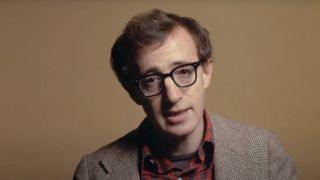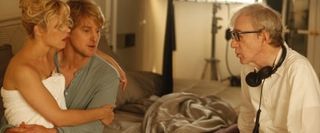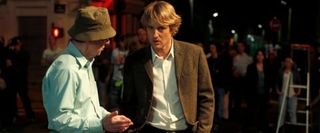Interview: Woody Allen Talks Europe, New York And Missing Baseball For Midnight In Paris

Woody Allen is a storyteller. That's obvious to anyone who's followed his career, of course, watching him move to stand-up to writing books to writing and directing films that have become a firm, vital part of American pop culture. But it's even more obvious when you see him doing an interview, even a big press conference, where most directors and even actors find themselves shrinking away from the masses and giving only the easiest answers. Allen, on the other hand, is up for answering pretty much anything, from inquiries about whether or not he's a Communist to tangential discussions about the New York theater scene. At the press conference earlier this week he also talked about his new film Midnight in Paris, of course, but it was almost like he was anxious to throw off another bon mot about European water pressure instead.
Below are some of the highlights from that press conference, which ran for 45 minutes but easily could have gone on for hours. Allen talks about his method for working with actors and cameramen, what he'll miss about America while he's shooting in Rome this summer (you can read the details he gave us about that project here), his scrapped plans to make a movie of The Great Gatsby, how he thinks he's "only scratched the surface" of New York City in his films, and much much more. His new movie Midnight in Paris, which is delightful, opens in limited release this Friday.
In the movie Gil [Owen Wilson's writer character] keeps getting called a Communist by his future father-in-law. Why did you include that political standoff? Have you ever been called a Communist?
I've never been called a Communist. I could never even share a bathroom. I'm a Democrat, and just wanted to make the girl's parents in the movie antithetical to Gil. I wanted him to be a good-natured guy who tried to get along with everybody, and the mother was annoyed that she was marrying him, figuring her daughter could do better, and that the father didn't like him politically. They belong to that strain of Americans who are always critical of France and always have a problem, who wanted to change it to Freedom Fries. I just thought that would be funny, but I had no other motivation other than that. It expresses my own political feelings. I would never do anything that didn't, that ran antithetical. I wouldn't make my hero a Fascist for example. But I was really just trying to be amusing.

Is it different working with Owen given that he's also a writer?
I didn't know he was a writer at all. I didn't do anything different at all, with any actor. The screenplay is not written in stone. As soon as they're hired for the movie, I tell them that they're free. If there are any speeches that they don't want to do, anything they want to add or subtract or change, go right ahead and do it. I watch them closely and if there's some egregious mistake they make I tell them, but most of the time I don't. If there's a joke or a speech I wrote that embarrasses them to say, they don't want to say it and they don't say it, and I couldn't care less. They see the scene and they feel more comfortable doing it their way-- that's fine with me. As long as the thing gets done believably on the screen. As long as they make it real or exciting or amusing, I'm very very happy to take credit for it later.
How has it been for you shooting in Europe instead of New York, and leaving business concerns aside, would you come back to New York to make a film?
CINEMABLEND NEWSLETTER
Your Daily Blend of Entertainment News
I can't leave business matters completely aside. I went originally to London because they offered to back Match Point. I had a very nice experience in London, found the London crews were just like the American crews. I found the same thing in Barcelona and Paris. They know what to do, the language barrier is minimal, most of them speak a little English or I can struggle through a minimal amount of French. In the United States I worked with a Chinese cameraman on three pictures for three years who never spoke a word of English, ever. One nice perk is that these foreign countries welcome you so generously. Everybody cooperates in such generous ways. They close off streets and you get police help, they're so enthused about it. It's not a tough thing. It's not like you leave home and you're stranded in the desert and nobody knows what to do with the lights. you go to a new city and it's great, you have new restaurants, new places to go to, it's very exciting.
You'll be back here on day though.
I'd love to. There's a million things to do here, a million stories to tell, a million great locations in the city. I've made many many movies here, and I don't think I've even scratched the surface of New York City. And there are advantages to being at home. For example, I'm going to Rome this summer. I'm not going to be able to see any baseball, and that's a big loss for me. I will have three months of a hotel shower. I have a great shower at home, it comes down hard and hot. It's nice to work at home, I like that-- my own bed, my own house, all my surrounding pharmaceuticals. But there are exciting things to being abroad as well.

Is there any truth to the rumor that you wanted to make a movie about Zelda Fitzgerald?
No, there's no truth to that. I would have liked to have made, years ago, The Great Gatsby. It's a great film for me to make. I think I could have done a good job with it, because I like that era, and it's a New York/Long Island film. I just feel I could have made that film work. I've always had a crush on women like Zelda Fitzgerald. Now, this is very self-destructive, and I've always selected, in my lifetime, women who had that streak of insanity that she had. It didn't do me any good, but I was fascinated by it always. I've used that kind of character in my movies many, many times. I think I would have been good to make that picture, but it was never in the cards. I was not eligible to make it when it first started, it's been made a few times, I think they're making it again. But it was a nice thought.
If you could time travel, would 1920s Paris be your first choice?
Time travel is a tricky thing, because you extrapolate only the best. Women were dying the childbirth, people were dying of tuberculosis, you'd go to the dentist and they'd drill and they'd kill you. But you think of Gigi and horse-drawn carriages and champagne and Maxime's. I'd like to time travel for the day. Go back to the Belle Epoque, have lunch, go home. I would go to the Belle Epoque Paris. Paris before all the stores on the Champs d'Elysses, the terrible T-shirt and postcard joints, the way it was conceived had to be astonishingly beautiful. You can't fathom how beautiful it must have been.
Staff Writer at CinemaBlend
Most Popular




